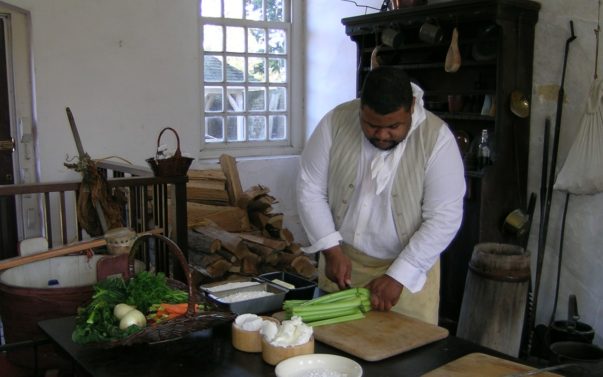“Call soul food what it is: the edible scripture of the Black aesthetic, the culinary answer to jazz, memory food of a people.”
That’s a tweet from Michael Twitty, a culinary historian from Maryland, who sees Cleveland as “the deep north.” To stay warm, he kept on his light grey jacket as he addressed the audience at the Cleveland Natural History Museum gathered for his December talk, “A Place at the Table.”
He begins with a question: “What if the enslaved could tell their story through food?” The story of American history, he argues, lies within the story of the foods people in bondage ate and the meals they cooked for others. It grieves him that so many hadn’t been properly acknowledged or recorded.
Via his food blog, AfroCulinaria.com, Twitty seeks culinary reconciliation. He has poured years into researching the origins of Southern cuisine and the agricultural connections between West Africa, the Caribbean and North America. His tweets at @KosherSoul are just as rich.
A childhood trip to Colonial Williamsburg sparked young Michael’s interest. The splendor of the kitchen in the Governor’s Palace fascinated the 7-year-old foodie. “My father was a Vietnam vet and all he wanted to see was guns and the cannons going off,” he said. “I had him in the kitchen for an hour and a half, staring at this beautiful pheasant. . . I actually flirted with the pheasant.”
It’s fitting then that the Twitty family – both living and ancestral — features prominently in his work. He started The Cooking Gene, a crowdfunded culinary tour of the South, five years ago, as he traced his family tree through two centuries. Along with a host of scholars and chefs, he visited the lands they worked and in some cases, sought to meet the descendants of the people who owned them.
Twitty’s first book, of the same name, will arrive in 2017. A few prospective publishes worried that Twitty’s identities – a black, gay, Jewish man – would be too much for readers. “This country is the only place I’m possible,” he retorted. “How dare you deny me the one thing America can give me – my uniqueness. My possibility.”
When Twitty hosts cooking demonstrations on former plantations and historical sites, he dons the full 18th century attire of those in captivity. He uses tools that would have been readily available to that population – cast iron skillets feature heavily – and recipes that would have been intimately familiar to the enslaved people on the plantation. Think okra and rabbit soup or mashed black eye pea fritters.
From the lectern in Cleveland, Twitty was careful with his language. He mentioned “enslaved people,” not slaves. “Slaveholders,” not master. They were “freedom seekers,” not runaway slaves. “Better yet, patriots,” he insisted. “Not slave rebels—patriots. They only wanted what America promised.”
In his work as a culinary historian, he has mastered the art of preserving culinary history, deftly maneuvering his way around a reluctant elder to slowly ease down their guard as he tries to capture their recipes. His first tip? Present yourself as a helper, not a pest. “Don’t be lazy; do some work. Wash the dishes, sweep the floor,” Twitty advises. Only then can you sidle up with questions about ingredients. Another tip? “Keep some measuring spoons in your pocket.” All the better to measure what the elders tend to eyeball.
He also brings dearly won kitchen wisdom to our political moment: “With these incidents of hate that we see, we have a choice. And that choice is to feed people. Feed them knowledge. Feed them love.”


